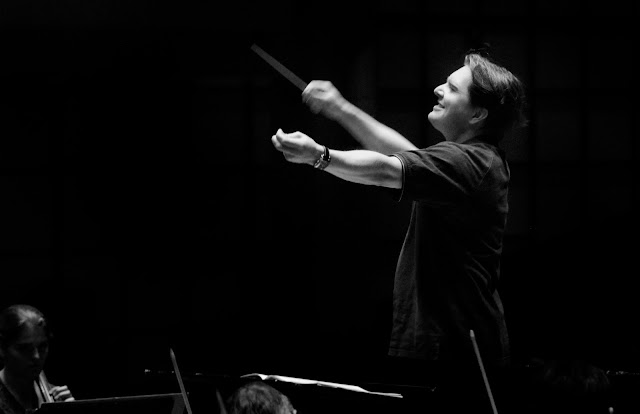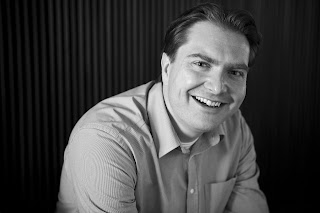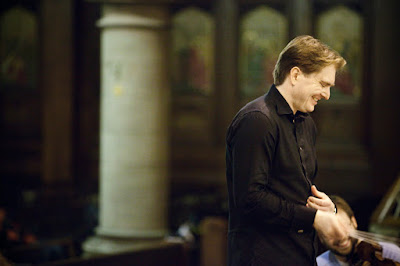 |
| James Lowe by Trond Husebo |
The young British conductor James Lowe is best known in the UK for his work with the BBC Scottish Symphony Orchestra, the Scottish Chamber Orchestra and for his tenure as the Artistic Director of the Halle Harmony Youth Orchestra. Out of the UK his career as burgeoned and he now has not one, but two chief conductorships to his credit. James is chief conductor of the Prussian Chamber Orchestra (Preußiches Kammerorchester) in Germany and this week takes the post as the Chief Conductor of the Vaasa Symphony Orchestra (Vaasan kaupunginorkesteri). I caught up with him by telephone to find out more, and we had a lively conversation about James's career. He is clearly interested in more than the music, keen to explore what orchestra are for and what they mean to their communities. And has a nicely depreciating touch in conversation, at one point commenting that he hates the word maestro and later saying that all conductors are mmegalomaniacs at heart!
Vaasan kaupunginorkesteri
Vaasan kaupunginorkesteriin Finland. I recently interview James by telephone (he is based in Berlin) to chat about the developments in his career.
I was curious as to how his connection developed with Vaasa (a city on the West coast of Finland). He explained that like many young conductors of his generation, he studied conducting with the great Finnish conductor Jorma Panula, whom James describes as one of the great teachers of conducting. Panula runs a conducting competition in which James competed four or five years ago. The orchestra for the competition is the Vaasa Symphony Orchestra, and James won the orchestra prize (nominated by members of the orchestra), so he has been going back to work with them ever since.
 |
| James Lowe & the Vaasa Symphony Orchestra (Vaasan kaupunginorkesteri) |
an outside temperature of -25 degrees C. takes some getting used to
James loves working in Finland and enjoys making music with the Vaasa Symphony Orchestra but admits that an outside temperature of -25 degrees C takes some getting used to. He finds that in Finnish society they don't just pay lip-service to the concept that everyone is equal, and this is something that James likes. He says that he despises the word maestro, and usually if members of an orchestra call you that then you are in trouble. For him, though a conductor has a leadership role they are still a musician amongst musicians.
James will be working around ten to 15 weeks per year with the orchestra, and already has six concerts planned along with other events. Repertoire will of course be heavily centred on Scandinavian composers. James refers to Sibelius as a culturally defining character in Finland, there will be a lot of Sibelius and this is repertoire which James loves. There is also a healthy new music scene in the city.
 |
| James Lowe - © Jen Owens |
also interested in what an orchestra is for
But as the chief conductor of an orchestra, James is also interested in what an orchestra is for. He feels that many of the existing structures were consolidated in the 1950's and society has changed a great deal since then. He wants to keep an eye on ways of adding work and expanding audiences. He comments that audiences are still heavily structured, and he is interested in how you can persuade a theatre or dance audience to come to a concert. He sees it as hard to reach outside the existing audiences, and will be looking at ways of broadening the orchestra's range of customers.
a whole corner of the repertoire of which he was unaware
His other orchestra, the Prussian Chamber Orchestra is based on Prenzlau, which is 90 minutes North of Berlin and most famous as the area from which Angela Merkel came. This post has required James to lean what he describes as 'an awful lot of repertoire'. Part of the orchestra's funding means that in addition to their classical concerts they perform concerts of Unterhaltungs Musik which James translates as 'entertainment music', and these concerts involve a lot of Berlin operetta, composers he had not come across and in fact a whole corner of the repertoire of which he was unaware.
Regarding learning music, I ask if he is a quick study and he says that he likes to think he is, but he has already got quite a lot of repertoire under his belt. For his next concert, two of the pieces he has performed more than once, one he has performed once and one is new to him. Inevitably a conductor has a high turnover of repertoire, and James feels that he has figured out a way to learn.
 |
| The Prussian Chamber Orchestra |
a viola player by birth ('imagine what a difficult birth that was')
He didn't start out intending to be a conductor, and rather wandered in to it almost by accident. He is from Nottingham and describes himself as a viola player by birth ('imagine what a difficult birth that was'). He planned to continue the viola playing and before studying at Edinburgh University he took a gap year to earn, so that he had some money behind him. Duncan Lloyd, the boyfriend of a friend, conducted an amateur orchestra the Djanogly Community Orchestra, and Duncan asked James to help out playing the viola. At the post-concert curry the idea came up of James conducting, he tried it and it worked. This ended up with Duncan letting James conduct the orchestra for the next year, the orchestra was very supportive and James found the experience hugely valuable.
His plan had been to do an academic degree in Edinburgh and then a post-graduate in the viola, but when he got to Edinburgh he found lots of music making and lots of conducting opportunities. He started studying conducting whilst he was still a student and took summer courses. The university paid for him to go on a course in Czechoslovakia which was given by the great Russian conductor and teacher Ilya Musin. After university James worked for a bit to pay off his debts, but the week before his finals he had travelled to St Petersburg to watch Musin giving lessons. The idea of going to study with Musin arose, but before this could happen Musin died.
 |
| James Lowe - photo Jen Owens |
All this hard work has paid off, not only was James a prizewinner in the Jorma Panula Competition, but he was one of two prizewinners in the Tokyo International Competition for Conductors, as well as being Benjamin Zander Conducting Fellow with the Boston Philharmonic and Assistant Conductor to Haitink in performances with the Concertgebouw Orchestra in Amsterdam.
conductors are all megalomaniacs at heart
When I ask James about repertoire, he says that as conductors are all megalomaniacs at heart the symphonies of Mahler and Bruckner are heard to beat. He is also finding that he gets more in tune with Sibelius as he gets older. With his German orchestra he performs a lot of Haydn and Mozart which he is loving. The music is so perfectly constructed and appears so simple, but if there as anything in the performance which is slightly not perfect, then this tells. He adds, that it is for this reason that auditions for violinists usually include a movement of a Mozart concerto. For James, Mozart not only has to be expressive but the music must have a story to tell just as in the operas.
Regarding a desert island piece to conduct with no restrictions he first thinks of Schoenberg's Gurrelieder (commenting about the megalomaniac side coming out again), but then says that what would count was not the piece but the orchestra. When he assisted Bernard Haitink at the Royal Concertgebouw Orchestra in Amsterdam, he found that not only did the orchestra play fantastically well but James was able to appreciate the players sheer enthusiasm and intellectual curiosity. And he refers to having profound conversations with the bass trombone.
Bernard Haitink is a conductor that James clearly admires. Not only is Haitink still conducting but he never rests on his laurels and James points out that Haitink's most recent Beethoven and Brahms cycles had been completely re-thought compared to his previous ones. He is inspiring in the way he is still digging, still full of energy.
James Lowe conducting the Danish premiere of Hafliði Hallgrímsson's Herma (1995) for cello and string orchestra, with Jacob Shaw (cello) at Det Kongelige Danske Musikkonservatorium.
Elsewhere on this blog:
- Powerful and thoughtfl: Jonathan Plowright at Rhinegold Live - concert review
- Classical music hyper production conference: my report - conference report
- Gripping theatre: Stuart MacRae and Louise Walsh's The Devil Inside - opera review
- Invigorating Brahms, Dvorak, Shostakovich: Salomon Orchestra at St John's Smith Square - concert review
- Complete Tippett live: Heath Quartet on Wigmore Hall Live - CD review
- Beyond Arcady and Bethlehem: NYCoS National Girl Choir and Karen Cargill in Michael Head - CD review
- A night at the Chinese opera: Zeffirelli's Turandot extravaganza on Metropolitan Opera HD Live with Nina Stemme - opera review
- Magnificent feast: Mozart's Birthday at the Wigmore Hall - concert review
- Celebrating Bob Chilcott: Tenebrae Consort & Nigel Short at Kings Place - concert review
- The Deer's Cry: Music from the Sixteen's 2016 Choral Pilgrimage - CD review
- Inspired by Mozart: Beethoven's opus 69 sonata for piano & cello - CD review
- Home











No comments:
Post a Comment